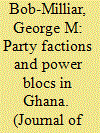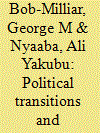|
|
|
Sort Order |
|
|
|
Items / Page
|
|
|
|
|
|
|
| Srl | Item |
| 1 |
ID:
092983


|
|
|
|
|
| Publication |
2009.
|
| Summary/Abstract |
This article is about the institution of the Nksuohene/hemaa and how it relates to African Americans. The Nksuo stool was created in 1985 by the late Asantehene, Otumfuo Opoku Ware II, as a catalyst for development in Kumase and beyond. Since the 1990s, hundreds of African Americans and some white Westerners have been honoured with various royal titles. Do African Americans understand the Akan conception of slavery and a person of slave origins? Conversely, is the diasporan concept of slavery understood by Akans? In general, and using the case of the Nksuohene/hemaa, this article sets out to show how fluid the chieftaincy institution is in Ghana. Its continuous importance is seen in the development agenda that it has adopted to serve new needs and aspirations. The article makes a case for African Americans to look beyond the Akan regions of Ghana in search of their roots, and argues that such studies can advance understanding of slavery and its legacies in Ghana.
|
|
|
|
|
|
|
|
|
|
|
|
|
|
|
|
| 2 |
ID:
112386


|
|
|
|
|
| Publication |
2012.
|
| Summary/Abstract |
With the increasing consolidation of her democracy, Ghana has, once again, become a cause for celebration and a source of pride in Africa. This newfound status as the bellwether state of African democracy makes Ghana ripe for a critical analysis of her democratic institutions. This article places the handling of parliamentary primaries by the two leading political parties in Ghana - the National Democratic Congress (NDC) and the New Patriotic Party (NPP) - under the microscope for closer scrutiny. The article interrogates the nature of these primaries, the procedures that govern their conduct, the factors that determine whether or not they are held, and the extent to which these parliamentary primaries have satisfied or deviated from democratic norms. It concludes that, while tremendous progress has been made in the candidate selection process by both major parties, there is plenty of room for improvement to ensure that the process is sufficiently empowering of voters in the constituencies and, hence, genuinely democratic.
|
|
|
|
|
|
|
|
|
|
|
|
|
|
|
|
| 3 |
ID:
120908


|
|
|
|
|
| Publication |
2013.
|
| Summary/Abstract |
Competition for the executive leadership of a political party and the distribution of state patronage in Ghana is influenced by factional alignments and group interests. In December 2008 the National Democratic Congress (NDC) regained political power, and within months rifts appeared over the allocation of ministerial portfolios. The intra-party murmurings became public when two factions supported rival candidacies for the party's presidential nomination. The pro-Rawlings faction supported the candidacy of Nana Konadu Agyemang-Rawlings, and the anti-Rawlings bloc backed President John Evans Atta Mills. Drawing on Boucek's (2009) typology of factionalism, this article argues that factionalism within the NDC is a dynamic and complex process of informal groupings competing and jockeying for power to satisfy members' interests. It draws three conclusions: party factions are ad hoc groupings that are nurtured into a power bloc, and are constellated around particular individuals; factional conflicts are not rooted in ideology, but are based on differences in policy goals, interests and patronage; and, finally, factionalism fluctuates between cooperative and competitive phases.
|
|
|
|
|
|
|
|
|
|
|
|
|
|
|
|
| 4 |
ID:
174564


|
|
|
|
|
| Summary/Abstract |
What role does a commission of inquiry (COI) play in delivering accountability? In theory, when the public delegates power to political leaders to formulate and implement policies, they seek political accountability in return. Using Ghana as a case study, this study examines how the operations of COIs may deliver accountability. Principal–agent theories of accountability and African conceptions of legitimacy are incomplete on their own and need to be integrated into an explanation of political accountability that takes into consideration political transitions and the role of COIs in delivering a minimalist form of accountability. This study argues that a COI is an instrument of regime legitimatisation. The demands by citizens for political accountability in Ghana correlate with political transitions. Accompanying each power alternation was a different model of political accountability. To understand the predominant applications of accountability, we emphasise the politicisation of accountability.
|
|
|
|
|
|
|
|
|
|
|
|
|
|
|
|
|
|
|
|
|